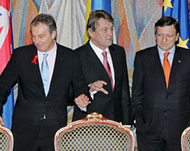Europe feels chill of gas dispute
Europe is beginning to feel the chilling effects of the dispute that has led Russian energy giant Gazprom to cut supplies to Ukraine while the Ukraine president has met ambassadors from EU states, Japan and the US in Kiev to discuss the crisis.

Ukraine is ready to defend its position in the dispute “by any means, particularly through the involvement of international experts and arbitration”, the Ukrainian president’s office said after the meeting.
President Viktor Yushchenko also said Kiev “was respecting all international agreements, including the transit of Russian gas to Europe” via Ukraine.
Russian state monopoly, Gazprom, said enough gas was being piped via Ukraine to supply other countries, and if they were not getting their gas, Ukraine must be diverting it.
|
“Russia is using unrestrained monopoly power to discipline a politically insubordinate neighbour” Werner Hoyer, |
Gazprom said Ukraine had “stolen” gas destined for Europe worth more than $25 million. Ukraine has denied this but says it will take gas if temperatures fall below freezing.
Ukraine acts as a transit country for most of Russia’s gas consignment to Europe.
“A scenario aimed at creating economic pressure and blackmail has started,” the Foreign Ministry in Kiev said.
Sharp supply fall
Gas supplies to much of Europe have fallen sharply as a fallout of the Russia-Ukraine pricing dispute while several nations have urged energy-hungry industries to switch to oil and rationing began in Serbia.
Europe imports about a quarter of its natural gas supply from Russia, 80% of that via Ukraine. And concern has risen that a prolonged standoff could spell severe problems.
 |
|
Europe imports a fifth of its gas |
The German government urged Russia and Ukraine to compromise quickly in order to resolve their dispute.
Russia took over the rotating presidency of the Group of Eight most wealthy nations on Sunday, with Vladimir Putin, the Russian president, looking to convert his country’s energy wealth into political influence.
East European countries – many with a record of decades of energy dependency on Moscow established during a half century of domination by the former Soviet Union – were the most hurt on Monday.
The gas dispute was the focus of a planned meeting of European energy officials set for Wednesday in Brussels.
In announcing the meeting on Friday, Andris Pielbalgs , the EU energy commissioner, said the EU’s Gas Coordination Group would deal “with all eventualities”.
European observers on Monday accused Russia of bullying a smaller neighbour that has sought closer relations with the West, asking what kind of neighbour cuts off gas supplies in winter.
 |
|
Under Yushchenko (C), Ukraine |
Werner Hoyer, a senior legislator for Germany’s Free Democratic Party, said: “Russia is using unrestrained monopoly power to discipline a politically insubordinate neighbour.
“Who can guarantee that Russia won’t one day use the gas tap as a way to exert pressure or impose discipline on other countries, such as Germany?”
Mutual need
Beyond re-igniting European concerns about energy security, the crisis has threatened to revive anti-Russian sentiment that last flared in Europe a year ago, during Ukraine’s democratic revolution.
Most analysts expect Russia and Ukraine to reach agreement soon, since Russia needs European consumers as much as Europeans need Russian gas.
Michael Glos, the German economy minister, said on Monday that Germany will only look to import more Russian gas in the future if it knows that it can safely rely on its delivery.
In an interview with German radio station WDR, Glos also said Russia had an obligation to act responsibly in the dispute.